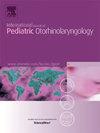Moral distress in Pediatric otolaryngology: A survey of ASPO members
IF 1.2
4区 医学
Q3 OTORHINOLARYNGOLOGY
International journal of pediatric otorhinolaryngology
Pub Date : 2025-04-26
DOI:10.1016/j.ijporl.2025.112365
引用次数: 0
Abstract
Objectives
1. Determine the prevalence of moral distress for pediatric otolaryngologists in North America.
2. Evaluate the impact of demographic variables on moral distress levels.
Methods
Moral distress is defined as “when one knows the right thing to do, but institutional constraints make it nearly impossible to pursue the right course of action”. The Moral Distress Survey-Revised (MDS-R) is a 21-question survey measuring moral distress in pediatric patients. A modified MDS-R (validated with pilot data in pediatric otolaryngology) was anonymously distributed to American Society of Pediatric Otolaryngology (ASPO) members. Descriptive statistics, bivariate and multivariate analysis were performed.
Results
Response rate was 86/656 (13 %). Mean modified MDS-R score was 49 (range 3–128), which is lower than that found in the literature for pediatric surgeons (mean 72), pediatric intensivists (means 57–86), and similar to pediatric oncologists (reported means 42–52). Female respondents had higher MDS-R scores than males (60 vs. 50). Providers in practice <20 years had higher moral distress scores than those practicing >20 years (54 vs. 43). Factors leading to higher degrees of distress involved communication breakdowns/lack of provider continuity and seeing other providers provide false hope to patients.
Conclusion
Pediatric Otolaryngologists have low degrees of moral distress compared to other pediatric subspecialists. Those with fewer years of experience have higher levels of moral distress. Further research is necessary to determine the impact of moral distress on the wellness of pediatric otolaryngologists.
儿童耳鼻喉科的道德困扰:对ASPO成员的调查
Objectives1。确定北美儿科耳鼻喉科医师道德困扰的流行程度。评估人口统计变量对道德困境水平的影响。道德困境被定义为“当一个人知道该做正确的事情,但制度限制使其几乎不可能追求正确的行动方针”。道德困扰调查-修订(MDS-R)是一个21个问题的调查测量儿科患者的道德困扰。修改后的MDS-R(经儿科耳鼻喉科试点数据验证)匿名分发给美国儿科耳鼻喉学会(ASPO)会员。进行描述性统计、双变量和多变量分析。结果有效率86/656(13%)。平均改良MDS-R评分为49分(范围3-128),低于儿科外科医生(平均72分)、儿科重症医师(平均57-86分),与儿科肿瘤学家(报告平均42-52分)相似。女性受访者的MDS-R得分高于男性(60比50)。从业20年的医疗服务提供者的道德困扰得分高于从业20年的医疗服务提供者(54比43)。导致更高程度痛苦的因素包括沟通中断/提供者缺乏连续性以及看到其他提供者给患者提供虚假的希望。结论小儿耳鼻喉科医师道德困扰程度较其他儿科专科医师低。经验较少的人有更高程度的道德困扰。需要进一步的研究来确定道德困扰对儿科耳鼻喉科医生健康的影响。
本文章由计算机程序翻译,如有差异,请以英文原文为准。
求助全文
约1分钟内获得全文
求助全文
来源期刊
CiteScore
3.20
自引率
6.70%
发文量
276
审稿时长
62 days
期刊介绍:
The purpose of the International Journal of Pediatric Otorhinolaryngology is to concentrate and disseminate information concerning prevention, cure and care of otorhinolaryngological disorders in infants and children due to developmental, degenerative, infectious, neoplastic, traumatic, social, psychiatric and economic causes. The Journal provides a medium for clinical and basic contributions in all of the areas of pediatric otorhinolaryngology. This includes medical and surgical otology, bronchoesophagology, laryngology, rhinology, diseases of the head and neck, and disorders of communication, including voice, speech and language disorders.

 求助内容:
求助内容: 应助结果提醒方式:
应助结果提醒方式:


